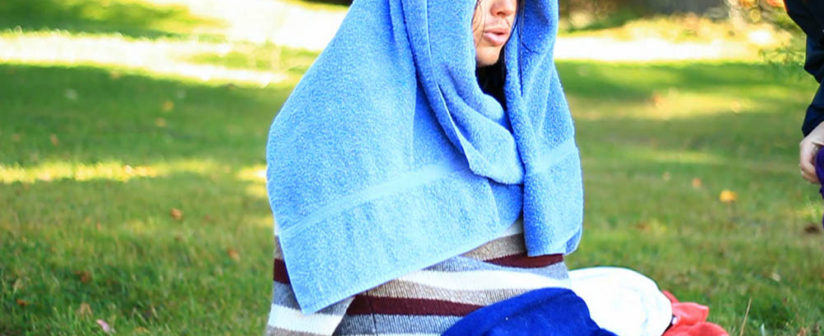Heat exhaustion is a condition whose symptoms may include heavy sweating and a rapid pulse, a result of your body overheating. It’s one of three heat-related syndromes, with heat cramps being the mildest and heatstroke being the most severe. Heat Exhaustion is likely to occur when a person’s body temperature rises above 37 degrees but below 40 degrees celsius. The body cools itself by sweating and allowing that sweat to evaporate. This requires enough fluid in the body to make sweat, air circulating across the skin, and low enough air humidity to allow that sweat to evaporate.
Causes
When we exercise, our bodies cool off by sweating. As we perspire, we lose necessary body fluids. If we do not replace these fluids, we become dehydrated. This makes it difficult to sweat and cool down, which can result in a heat exhaustion.During regular exercise, 70 to 90 percent of the energy our bodies produce is released by heat.
Many factors can hinder heat release and perspiration. These include:
Environment. Air temperature, combined with humidity, wind speed, and sun affect how well our bodies cool themselves. Humidity influences how easily sweat can evaporate. High humidity (greater than 60%) makes sweat evaporation very difficult.
Clothing. Dark clothing absorbs heat. This can dramatically increase the chance of heat stress. Full body clothing, heavy pads, and helmets make cooling more difficult.
Sun exposure. Direct exposure to the sun with no available shade can increase your core body temperature.
Fitness level/acclimatization. Before exercising in the heat, athletes must be in good physical condition. They also need to give their bodies’ time to adjust to warmer temperatures.
Age. Children adjust to heat more slowly than adults. Their bodies are less effective at regulating body heat.
Dehydration. Even mild levels of dehydration (3-5% of body weight) can hurt athletic performance. If you have not had enough fluids, your body will not be able to effectively cool itself through sweat and evaporation.
Pre-activity hydration status. Athletes who start activities in an already dehydrated state are at greater risk for heat injury. Factors that can affect your pre-activity hydration status include inadequate rehydration after a previous exercise session, alcohol consumption, rapid weight loss regimes (i.e. wrestling), and fever, vomiting, or diarrhea.
High body fat. Athletes with high body fat have greater difficulty cooling themselves.
Fever. Anyone with a current or recent fever may be at increased risk.
Medications. Diuretics and stimulants may increase risk.
Sickle cell trait. Sickle cell trait or disease increases the risk for heat illness. This is especially true if good hydration and electrolytes are not maintained.
SYMPTOMS
Altered Mental State : Drowsiness, fatigue, confusion, and dizziness. If you feel any of these altered mental states, your body is likely reacting to the heat.
Dark or Yellow Urine : The Ole’ Urine Test. You’re aiming for a light yellow, nearly clear urine for proper hydration.
Muscle Cramps : This has to do with the lack of sodium (salt) in your system, causing your muscles not to work as you want them to. Grab the sports drink mix for muscle cramps.
Nausea : Feeling sick to your stomach? It might not have been grandma’s potato salad after all.
Pale Skin and Profuse Sweating : A lighter skin, coupled with profuse sweating, can be an indication for heat exhaustion.
Rapid Heartbeat : Like a car overheating, your body might go into overdrive to cope with the heat.
TREATMENTS
Whether it’s heat exhaustion or potential heat stroke, the treatment can be the same. After deciding whether medical professionals need to get involved, the main goal in treating either heat stroke or exhaustion is cooling the body down.
Rest : Find a nice spot in the shade, by water, or in air conditioning to let your body cool down.
Remove Clothing : Keep your skin out of direct sunlight, but remove any clothing that may be restrictive to blood flow.
Drink Fluids : A chugging contest is not the best way to introduce fluid to your body, but do make sure you are drinking plenty of fluids at a comfortable, even pace.
Get in Water : Taking a shower or bath, or sponging off in the river, will help your body reach a normal temperature.
Fanning and Ice Towels : If you are going to use a fan, preferably have a method to keep your skin wet as well. The fans will keep the moisture flowing on your skin, recharging your battery as you cool down.


